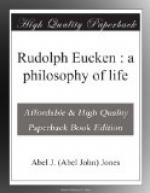What is it that makes it possible for one human being to “live into” the experience of others who lived long ago, and for the present to conquer and alter the past? How can we account for the eternal trait in thought, for the unchanging laws of logic, for the consistency of moral ideals, and their transcendence over flesh and immediate circumstances? What is the force behind the idea, and how can we account for the continuous struggle of mankind in certain directions? And, finally, what is it that makes it possible for men to rise beyond themselves, to shake away the shackles of matter and vicinity, and to delve deep into the profounder world?
If we can find what it is that makes all this possible, then surely we have found the greatest thing in the world—the reality. And Eucken’s answer is clear and definite. It must be something that persists, is eternal and independent of time, and it must extend beyond the individual to a universal whole. This must be “the Universal Spiritual Life,” which, though eternal, reveals itself in time, and though universal, reveals itself in the individual man, and forms the source from which the spiritual in man “draws its power and credentials.”
This, then, is the result of Eucken’s search for reality—he has found it to exist in a Universal Spiritual Life. Of course he has not arrived at his conclusion by a system of rigid proof; it has already been pointed out how impossible it is to arrive at the greater truths of life in such a manner.
He has done, however, that which can be reasonably expected in such cases. To begin with, he has given us a striking analysis of the essential characteristics of human life, and he has found there a yearning and a void. He has given us a masterly discussion of eternal truth as contrasted with the temporary expressions of it. He has taught us how the present can overcome the past, and how man can ascend beyond the subjective and material. And he has led us to feel that reality must lie in the eternal that appears to be at the basis of the highest and greatest in man.
Moreover, he has given a fair and thorough treatment of the solutions that have been offered in the past. He has shown how inadequate they are to explain life. He has shown how the modern solutions “cannot perform their own tasks without drawing incessantly upon another kind of reality, one richer and more substantial.” This in itself shows “beyond possibility of refutation that they do not fill the whole of life.” He has demonstrated how the acceptance of these systems depends upon an implicit acceptance of a higher life. “The naturalistic thinker ascribes unperceived to nature, which to him can be only a coexistence of soulless elements, an inner connection and a living soul. Only thus can he revere it as a higher power, as a kind of divinity; only thus can he pass from the fact of dependence to a devotional surrender of his feelings. The socialist bases human society, with its motives mixed with triviality and passion, on an invisible community, an ideal humanity.... The individualist in his conception exalts the individual to a height far more lofty than is justified by the individual as he is found in experience.” All these assume more or less unconsciously the existence of that “something higher” which they attempt to deny.




